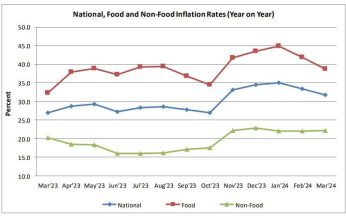Services exports key to growth—official
Malawi has the potential to become a competitive and visible exporter of value-added and poverty-reducing labour and tourism services, an official has said.
Speaking on Monday in Blantyre at the national stakeholders validation workshop on the situation analysis of services sectors and services trade in Malawi, Ministry of Trade director of trade Clement Kumbemba said services trade has potential to increase the country’s domestic and export performance.
The sector contributes about 52 percent to the country’s gross domestic product (GDP).
He said measures taken by importing countries such as burdensome procedural requirements, including licensing, registration and authorisation; commercial presence requirements, quotas, visa, administrative hurdles and non-recognition of qualifications, further limit the opportunities for export of trade in services.

Said Kumbemba: “If you analyse this sector further, you will note that it does not provide much of the decent jobs and wages and also relies on imported products which drain much of the foreign exchange.
“This provides us with a soul-searching question; which sectors sectors with high value should we concentrate on? Is it tourism? Financial services? Information and communications technology?”
The five-year draft National Services Export Strategy (Nses) shows that services sector can be enhanced by increased supply of tradable services, promoting services market access and enhanced economic sustainability and inclusivity.
Reads the report in part: “While appreciating the critical role of services in facilitating the production of goods and other services and in promoting both domestic and foreign trade, isolating services exports is critical in emphasising the significance of promoting the regional and global competitiveness of the country’s tradable services.”
In his Services Sectors and Services Trade in Malawi Situational Analysis Report, Ministry of Trade consultant Ronald Mangani attributed the growing economic significance of services to an increase in the distribution of imported products, a trend he said erodes foreign exchange and distresses the trade balance.
He said despite the recognition to promote export-led growth among policymakers, alongside the associated efforts, the country’s trade performance has not registered an improving trend with a negative trade balance of $661.3 million (K495 billion) between 1980 and 2018 and contributing about 20 percent to the labour force.
“In general, the productive economy of Malawi is not well diversified as it still depends on a poorly structured agricultural sector.
“Structural and supply-side challenges, low commodity prices and a weak industrial base are still daunting challenges,” said Mangani, who is also former Secretary to Treasury.
Currently, the Malawi Growth and Development Strategy III (2017-2022) continues to put emphasis on export promotion to improve the country’s net trade position through, among other things, energy, industry and tourism development.





